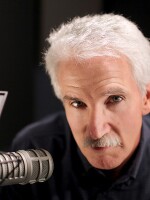If you want to trace the flow of stimulus money in New Hampshire, start at Jacqueline Doyon's house in Manchester.
The elderly widow's immaculate home is the set piece for a weatherization party. A new furnace, high-efficiency light bulbs and fresh insulation have cut her energy bills almost in half -- all thanks to programs funded by the economic stimulus.
Last year's stimulus package included nearly $300 billion for contracts and grants -- much of it for improving infrastructure. And more than half of those funds have yet to be spent. In New Hampshire alone, about $100 million in stimulus funds will go toward local projects by this fall.
Finding A 'Stack Of Jobs'
The Granite State's stimulus dollars are going to help people of modest means like Doyon. But the program also helps small contractors like Melissa and Robert Warchal, the owners of Warchal Insulation, which did the work on Doyon's house.
Late last year, things began to kick into high gear for the Warchals.
"There was just a stack of jobs waiting for us and it's been consistent ever since," says Melissa Warchal.
With so much work coming from the stimulus, the Warchals did what the Obama administration hoped -- they expanded.
"We ended up buying another truck and hired two full-time employees," Melissa Warchal says.
One of those new hires is 22-year-old Adam Baker, a construction worker who was laid off last fall. Baker got this job in April and he's grateful for it.
"You're not stressing about everything all the time and hoping that you're going to be able to pay your bills and so on," he says.
The job could not have come at a better time for Baker and his girlfriend.
"I'm actually expecting a child in November. So, we found out on Wednesday, actually, and I'm trying to put a lot of money aside for him," Baker says.
A Chain Reaction
Infrastructure spending from the stimulus is not new. What is new is the number of big projects finally getting under way, which will produce a lot of jobs. And each one will generate more jobs as people buy groceries and clothes and other items.
Baker's family owns Newfound Grocery -- a restaurant, deli and convenience store in New Hampshire's lakes region in the central part of the state.
The store sells a variety of goods from T-shirts to everyday food.
Even Holly Kerouac, Baker's mother, got a boost from the stimulus. The act paid for energy auditors and low-interest loans to install energy-efficient lighting.
Kerouac says she was told that it would pay for itself in less than eight months.
Even though this summer is the best she's had in two years, she remains anxious because too many local businesses have shut down. And too many middle-aged workers have no prospects for work.
How Far Will It Go?
Although the stimulus helped her son get a job and paid to improve her business, Kerouac says it hasn't filtered down to the average worker or small business.
That said, her sense of what's in the stimulus remains murky.
"I think a lot of people aren't educated on it -- myself included," Kerouac says. "You have to really be involved in it to understand just how far it does go."
Economist Russ Thibeault with Applied Economic Research estimates that between direct and indirect spending, the latest bolt of cash will generate at least another 4,000 jobs in the state.
"But you have to put it in the context of 50,000 people being unemployed right now," Thibeault says. "So, it's helpful but it isn't going to solve our problems."
Copyright 2010 NHPR



